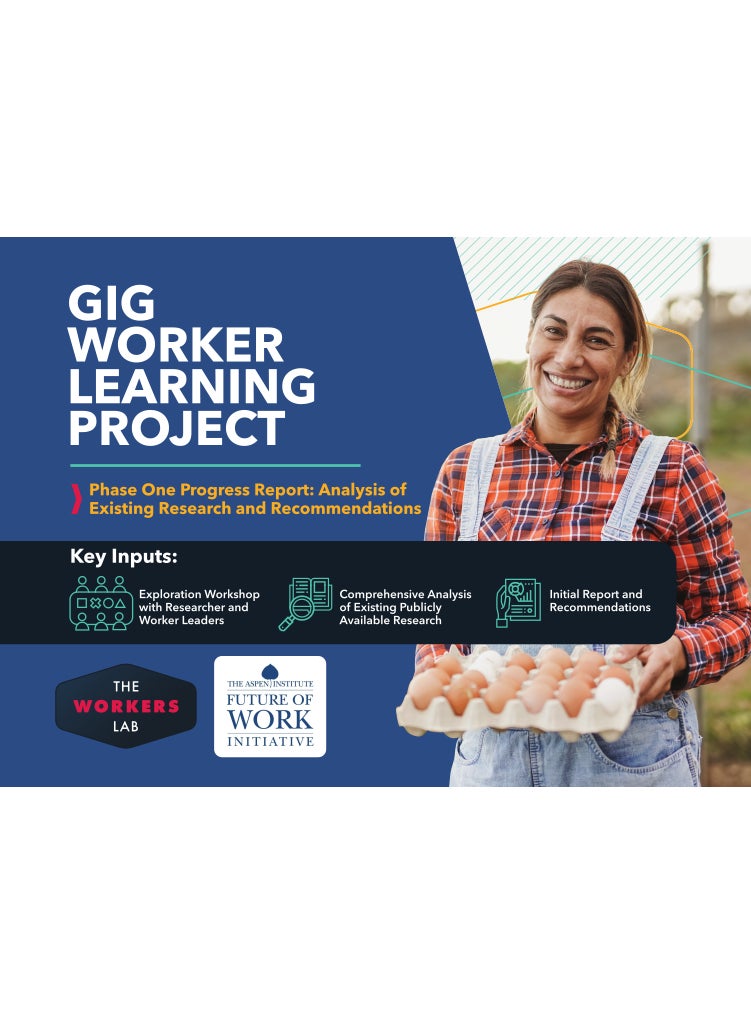Last year, The Workers Lab and the Future of Work Initiative launched the Gig Worker Learning Project to reflect on what we mean by “gig work” and clarify what we know about gig work and workers in direct partnership with workers themselves.
Before jumping into new participatory research, we compiled and analyzed existing research on gig and non-standard work to better understand where there are gaps, consensus, disagreement, and opportunities to learn more. Since the project launched, we have convened dozens of worker leaders and researchers to learn from their experiences, and analyzed more than 75 recent studies about gig and non-standard work and workers. Through this work, we are using the term “gig” as a starting point to engage with existing research on work today. The project intends to revise language as we hear from workers directly about the terms and categories they see as relevant.
We are excited to release our initial findings and recommendations for how worker leaders and researchers can start to bring clarity and consistency to future research and develop a comprehensive picture of workers’ experiences and needs.
In the report, we compare a range of recent studies to demonstrate the significant lack of common language that contributes to confusion and misunderstandings that keep us from meeting workers’ needs.
The report considers several questions, including:
- What is the “Gig Economy”?
- What are gig workers doing to make money?
- Who are gig workers?
- How do digital platforms affect the experiences of gig workers?
- How are gig workers using their incomes?
- What kinds of benefits and protections exist for gig workers?
Our review of research reveals that different researchers use the same terms with different meanings, that some researchers do not define the terms they use at all, and that differences in definitions can lead to contradictory findings.
Looking forward, we are building on this report with a series of participatory conversations with gig and non-standard workers. We are hearing how workers categorize their work, what motivates them, the challenges they face, and the solutions that could most impact them, their families, and their work.
From there, we hope to develop an ongoing, nation-wide research toolkit for organizations and researchers to use to center workers for better understandings and more effective solutions.
Share
Tweet Often, the researchers who study gig workers aren’t using the same terms and definitions, which leads to confusion and contradictory results. Learn more from @theworkerslab and @AspenFutureWork.
Tweet Check out the first phase report of the Gig Worker Learning Project and learn why the research around gig workers is leading to contradictory findings.
Tweet After a year of research and analysis, @theworkerslab and @AspenFutureWork released the results of a study on gig work. Their finding: the field of study around gig workers lacks clarity, which is leading to contradictory findings.
Learn More
The Future of Work Initiative aims to identify, develop, and amplify solutions that address the challenges of today while building toward a future in which workers are safe, empowered, and equipped to thrive in our changing world. The Future of Work Initiative is an initiative of the Economic Opportunities Program.
The Economic Opportunities Program advances strategies, policies, and ideas to help low- and moderate-income people thrive in a changing economy. Follow us on social media and join our mailing list to stay up-to-date on publications, blog posts, events, and other announcements.



